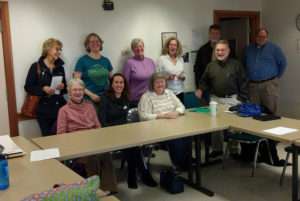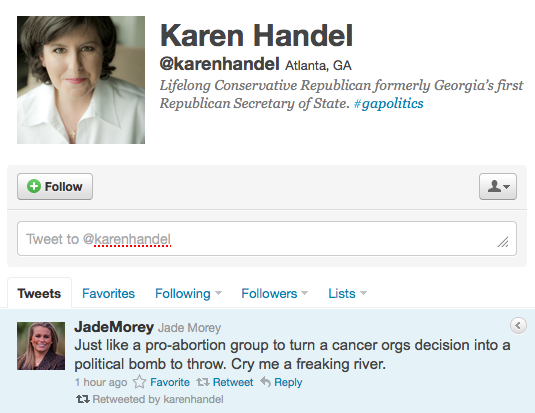 There is a lot of advice out there for nonprofits regarding how to use social media, but it is often written using corporate perspectives: success is only in terms of huge numbers of followers and messages that go “viral.” That type of pure quantitative measurement is meaningless and unrealistic for most small nonprofits, community groups, schools, small government programs, etc. There are far better, more realistic measurements of social media success for these small organizations – and this blog entry that you are reading now is an attempt to provide an example of that.
There is a lot of advice out there for nonprofits regarding how to use social media, but it is often written using corporate perspectives: success is only in terms of huge numbers of followers and messages that go “viral.” That type of pure quantitative measurement is meaningless and unrealistic for most small nonprofits, community groups, schools, small government programs, etc. There are far better, more realistic measurements of social media success for these small organizations – and this blog entry that you are reading now is an attempt to provide an example of that.
In addition to writing about volunteerism and community engagement, I am also a volunteer in my local community. I volunteer for all the usual altruistic reasons, but also to keep my skills sharp as a paid consultant regarding marketing, public relations and community engagement for mission-based organizations. One of my current volunteering activities is being a part of the League of Women Voters – specifically, the Washington County, Oregon unit. The League of Women Voters started as an organization engaged in activities to educate women as voters – it was formed just before women got the vote in the USA and to encourage them to vote. Now, it is open to all people and has a similar mission, now universal: to educate people regarding issues their legislators are voting on, to educate them on issues they will vote on in upcoming elections, and to encourage them to vote. The League takes stands on issues, but not candidates. Here in the USA, it’s often a local chapter of the league that hosts forums and debates for candidates running for office, and these chapters are all-volunteer staffed and managed.
One of the activities I’m doing with my local League of Women voters is overseeing the Twitter account, @LWVWashcoOR. I’m not looking to have massive numbers of followers. Rather, I’m thinking about engagement. So my goals regarding followers for the league account are that:
Every elected official representing Washington County, Oregon that has a Twitter account follows the local League. There’s no master list for this: there are more than 10 Census-related cities in this county, each with some form of local city council members. Plus there’s a county government, a Portland Metro government with a representative for our county on it, state legislators and federal legislators (the easiest to find). That’s almost 100 people try to find on Twitter – and I’m still trying to figure out who is and isn’t on Twitter. I follow all that I find, retweet their relevant information, and often ask them, point blank, to please follow our League’s Twitter account.
Key Washington County government offices on Twitter follow us. This is not easy, because many don’t understand what the League is – they think it’s a political organization in the sense of promoting agendas, rather than a non-partisan organization that’s promoting civic engagement – civic engagement that their programs need more of!
Every local political group (or state version of such) follows us. This is a double challenge because, per the non-partisan political nature of the League, I can’t follow them back: instead, I put them on one of our Twitter lists, so I can read their tweets. For that same reason, I refrain from retweeting many of their messages because of their partisan nature. It’s hard to get someone to follow you when you don’t follow them back.
Most nonprofits working in Washington County follow the League. Many of these nonprofits work with the most marginalized in our county, as well as young people, all of whom need the most assistance in understanding the political process and how to engage civically. As with elected officials here, I follow all that I find, retweet their information I think relates to the mission of the League, and often ask them, point blank, to please follow us.
Any individual that cares about voter education, voter registration, civic engagement and civic education follows us on Twitter. There are individuals in this county that, independently, tweet regularly about these issues. I put them on a list of politically-engaged local folks so I can check in with them regularly and I retweet their messages if they relate to the mission of the League. How do I find them? I look for people tweeting about town halls by our US Senators and US Congressional representative, for instance.
I find more followers to target and subjects to tweet by using various keyword searches, like the names of city and county officials, or the words Oregon and voting. I tweet original content every time I log in – could be a reminder regarding Oregon state legislation that’s coming up for a vote, could be a reminder about our own unit activities, could be a poem for #WorldPoetryDay.
How do I get followers for the League’s account. Various ways:
- From tweeting information that relates to our mission and that our desired followers will find relevant
- From looking for and using keywords so that people looking for those keywords can find us. That includes #Oregon, #voting, #voters, #legislation, #elections, #electionday, etc. I also look for what’s trending and seeing if there is a way to use such in a tweet of our own in that moment. And I create content specifically to tag with certain phrases, like #blackhistorymonth, #internationalwomensday, #humanrights, #fairmaps, #gerrymandering, #veterans, etc.
- From following someone that I want to follow the League
- From retweeting someone that I want to follow the League, even just once (but it usually takes more than that)
- By thanking someone for a retweet of our information
- By responding to someone’s tweet with a question or comment
- By asking someone to follow
I tweet a thank for every account that follows @LWVWashcoOR or that retweets one of our messages, so that their account can be shared with all of our followers, which I hope, in turn, gets them more followers.
I log in at least three times a week to do all of the above – it takes about 30 minutes each time. I try to mix up the times – sometimes in the morning, sometimes in the afternoon and sometimes in the evening, to reach different followers. I also schedule tweets via Hootsuite, so that something goes out most every day, but the reality is that I must spend actual time on Twitter, engaging with others, in order to get more followers and keep the ones we have.
 My desired results of all this? I hope these officials, agencies and nonprofits will become more open to coming to League events and promoting our resources. I hope they will see the League as a resource. I hope more people in general will attend our events and see us an election and legislative resource. I hope more people will pay and join the League of Women Voters Oregon Washington County Unit. I hope we will see more diversity among people who attend our local events and who join the League.
My desired results of all this? I hope these officials, agencies and nonprofits will become more open to coming to League events and promoting our resources. I hope they will see the League as a resource. I hope more people in general will attend our events and see us an election and legislative resource. I hope more people will pay and join the League of Women Voters Oregon Washington County Unit. I hope we will see more diversity among people who attend our local events and who join the League.
How many Twitter followers will achieve those results? I’ve no idea. But I do know that these results won’t come from massive numbers of followers outside of Washington County, or a post going viral. I believe these results will come from having local followers and local engagement. When I started, there were less than 10 followers for the @LWVWashcoOR account. Now, less than six months later, there are 100 – not a huge number, but when I look at who those followers are, I know that we’re on the road to achieving some of those goals.
My only complaint: local league members rarely retweet our unit’s tweets. Without their participation in helping to further amplify messages, it’s going to be difficult to reach all that we want to.

If you have benefited from this blog or other parts of my web site and would like to support the time that went into developing material, researching information, preparing articles, updating pages, etc., here is how you can help.
Also see:
- What is your social media manager doing?
- Why your public meetings are so sparsely attended
- The importance of Twitter lists
- Why I won’t follow you on Twitter
- How schools & small governments should be using social media
- Your initiative should exploit UN days
- 14 (was 13) things you do to annoy me on social media
- Daily, Mandatory, Minimal Tasks for Nonprofits on Facebook & Twitter
- Measuring social media success? You’re probably doing it wrong.
- Evaluating Online Activities: Online Action Should Create & Support Offline Action
- Volunteers can help you reach more people on Facebook
- How to handle online criticism of your organization.
- Mission-Based Groups Need Use the Web to Show Accountability
- Web Site Construction & Content Suggestions for Nonprofits, NGOs and small government offices
- Required Volunteer Information on Your Web Site
- Marketing Your Nonprofit, NGO or small government office Web Site
- Don’t Just Ask for Money!
- Nonprofits & NGOs: you MUST give people a way to donate online


